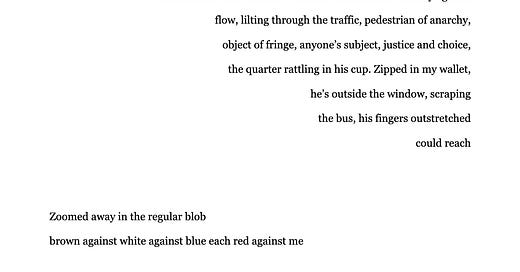ON THE BUS
by Ricky Novaes de Oliveira
This poem was first published in Rigorous in 2021.
Want a thought-provoking poem in your inbox every week? Embrace your destiny, or sign up your favorite auntie:
Thank you for reading the Poem of the Week! To my new subscribers: hello & welcome! To my old heads, hope you have been enjoying my words.
This week’s poem was written while commuting to and from summer internships in Los Angeles and Chicago, and it is a poem of movement and color. Like one of the previous POTWs, I would consider this poem to be another example of concrete poetry: there is the two images of “blobs” moving along, while opening a rift in the middle of the poem. There is guilt in the speaker’s voice; I wrote it to display the tension between being surrounded by people yet feeling that they are strangers. It is on a bus that we can see what our cities want us to, but there are always moments on public transportation that expose humanity for what we are.
What’s more is that you could consider “On The Bus” as a contemporary refraction of Ezra Pound’s “In a Station of the Metro.” Pound’s poem has stuck with me for its powerful impressionist imagery in just two lines, so I tried painting my own poem with a canvas of urban sprawl. I’m compounding on Pound, in a sense. Sorry for the bad joke. Sorry for lying. Let’s move on by reading Pound’s poem together:
IN A STATION OF THE METRO by Ezra Pound (1913, source) The apparition of these faces in the crowd: Petals on a wet, black bough.
Ghostly faces, shifting petals, and a stretching darkness. All that and more in two lines! There is a similar meditation on the transience of modern interaction within public spaces “On The Bus,” and I try to expand on who and what is implicated when others are seen as “apparition.” I think both of our poems speak to the alienation that urban spaces can often engender onto the soul—though we may be traveling together, we are often alone in our journeys.
Of course, in my opinion, “On The Bus” building off of “In a Station of the Metro” in the same way that Pound was building off of “The Gare Saint-Lazare” by Claude Monet, which I feel obligated to share as well. Perhaps you will notice more trends in this cohort of poems and painting we have now assembled:

While we’re on the topic of trains and art, I’ll recommend a book I read in college, Zazie in the Metro by Raymond Queneau. This book is Alice In Wonderland and Little Miss Sunshine, but in 1920 Paris. Get it as a holiday gift for your favorite lover of zany fiction books. Speaking of gifts, you clicking this button is on my wishlist:
Ok, enough about European men and their fixation on phallic vessels. I know I threw a lot of poets and art at you today; I promise I’m not just trying to flex. Really, I am so honored that you read this far and I hope this was a good read. I keep writing and I hope to keep sharing it with you.
Don’t be afraid to touch, Ricky




